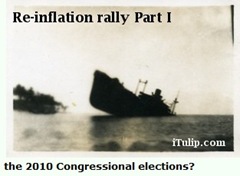Monday, August 03, 2009
Turd-waves of propaganda about the economy
by Larry Geller
You may have heard that the recession is about to give way to recovery. Even Obama is talking positively about a gradual recovery, as are his economic advisors (I ask: what have they done for us lately?). I don’t believe any of it, but who am I. So like any good blogger, I reach out to the experts, who fortunately, also have blogs. Isn’t it great?
So I went to visit Eric Janszen’s iTulip.com. You can, too, and it’s quite a trip. Fasten your seat belts, here we go for a short visit.
Eric Janszen. The name conjures up paragraphs like this one, from his current article, Re-inflation Rally Part I: Falsehoods, fantasies, fabrications, and fake-outs:
In the vast, raging deluge of falsehoods, fantasies, fabrications, and fake-outs that passes for news in the U.S., the river of informational sewage that collects in drips and spews from ducts and runoff of coin operated media outlets, occasional shimmering snippets of verified truth from immaculately credible sources bob improbably among torrential turd-waves of propaganda, hoopla, and fluff. From a perch at the shore they enter our field of vision and drift by like an immaculate flotilla of shimmering white swans on a river of shit, their incongruous beauty commanding our shocked attention.
Are you still here? Ok, now you know him a little. That paragraph should give you an idea of what he thinks of media reports, but does he actually have something to say about the economy that will help us understand? Yes, quite a bit, and he has numbers. In reality, he is a prescient economic forecaster.
Numbers are convincing, and he has them. It’s not like Larry Summers blathering Sunday on CBS, “Today we are talking about when recession is going to end,” but giving you no hint of his reasoning. I suspect that Janszen was thinking of this sort of thing when he wrote that bit about turd-waves of propaganda.
When I went to check out his current thinking in my newsreader, I spotted this picture. Note the caption. Aha! said I, great minds think alike. But no. That’s not really the caption of the picture. The last line of the paragraph next to it just wrapped around in the narrow window of the newsreader. Darn, great minds don’t think alike. I better pay attention to what he really said.
At least, we both like great graphics. A companion piece to the above article is FIRE Economy Explosion Fallout -- Part I: Recession ends, depression begins, and I recommend starting with that one. Good graphic there, too. And straightforward reasoning leading to hard-hitting conclusions.
Through trillions in bank bailouts and fiscal stimulus our leaders are shifting bad private debts to public account. In the process they substitute one kind of credit risk for another, public for private.
No wonder a Brazilian credit rating agency recently downgraded U.S. Treasury bonds.
Look, I can only give you a little bit of his very long article. Let me suggest reading further on the iTulip website. There is information that you can use in your next debate on the economy, even if that occurs just over the dinner table.
Or should you find yourself at a beer party with the president, you can remind him that:
The Great Depression did not end when the economy stopped shrinking in the first quarter of 1933, after contracting in real terms by 27% over the previous three years. At the time economists heralded the event as the end of the depression. In fact, they were less than a third of the way through the ten-year period between 1930 and 1940 that came to be known as The Great Depression.
Real GDP grew by 33% in the next six years that followed, but the economy needed 54% growth just to get per-capita GDP back to where it was in 1929, ten years earlier.
Even after expanding by a third over six years from the official end of the Depression, unemployment in 1939 exceeded 17% and did not decline to pre-Depression levels until 1943, three years into the war. Most historians mark the end of the Depression at the start of WWII.
Yes, folks, debt has been shifted to the public sector, and there are jobs that won’t come back. Ever. Probably. It doesn’t take an expert to know that college kids won’t find jobs to pay off their huge debts, that homes lost make money for the banks, so they won’t stop the foreclosures (and neither will Congress, it seems), and that our 401(K)s have been wiped out etc. I can figure that much out. That’s me talking. Janszen is more concrete.
So believe Obama and Larry Summers or believe Janszen.
I’ll leave you with some questions he asked. The answers follow in his FIRE article.
You won’t like them.
Where will the federal government get the money to cover states' unemployment insurance costs?
Where will the federal government get the money to finance a second stimulus program?
If not from foreign borrowing or taxes, where will the money come from?
If from taxes on capital, what will drive future productivity gains that will create organic growth?
That's my kinda sentence- a 58 worder that doesn't get to the verb until the 48th word- and then it's "bobs".
i'm an itulip regular, and that colorful and scatalogical passage is not the way janszen usually writes. he must have been pissed off. usually he's more composed. he's an excellent economic forecaster, mentioned in a recent european academic paper as one of 8 systematic analysts who saw the economic tsunami coming. worth reading. he's saved a lot of people a boatload of money.
<< Home





Post a Comment
Requiring those Captcha codes at least temporarily, in the hopes that it quells the flood of comment spam I've been receiving.